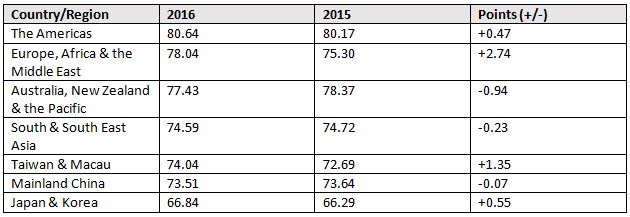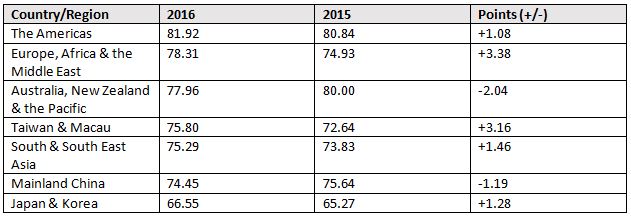The 2016 PolyU Tourist Satisfaction Index (PolyU TSI) and Tourism Service Quality Index (PolyU TSQI) show general increases compared with the 2015 results, according to the report released by the School of Hotel and Tourism Management (SHTM) of The Hong Kong Polytechnic University. The 2016 PolyU TSI and PolyU TSQI stood at 75.02 and 75.87 respectively.
The PolyU TSI increased by 0.31 points from 74.71 in 2015, reflecting an ongoing recovery from the significant drop in 2014. At the same time, the PolyU TSQI recorded an increase of 0.65 points from 75.22 in 2015.
“In 2016, the tourism industry in Hong Kong underwent some turbulence caused by various social and political issues in 2014 and 2015,” observed Professor Haiyan Song, SHTM Associate Dean, Mr and Mrs Chan Chak Fu Professor in International Tourism and Principal Investigator of the PolyU TSI, “the city’s image as a premier tourist destination was tarnished.” Against this backdrop, the 2016 TSIs for the source markets of Americas, Europe, Africa and the Middle East, Taiwan and Macau as well as Japan and Korea increased and those for the other three source markets decreased in comparison with the 2015 TSIs.
At the sectoral level, transportation, attractions and restaurants were among the tourist sectors affected.
The PolyU TSI evaluates service sector competitiveness not only over time but also across international tourist destinations. Aside from its importance to tourism practitioners in Hong Kong the index has broader applications and has been adopted by destinations including Singapore and Macau in 2010, Guangdong province in Mainland China in 2012 and Australia in 2014. The 2016 PolyU TSI is the eighth annual release of the index since its launch in 2009.
Launched in 2012, the PolyU TSQI is a weighted average of the six tourism service quality indices, representing the overall tourism service quality of Hong Kong.
At the market level, the PolyU TSQI of Mainland China and Australia, New Zealand and the Pacific scored lower than their 2015 counterparts.
As for the six tourism service sectors, an even fluctuation between increases and decreases was observed.
The 2016 PolyU TSQI score (75.87) was 0.85 points higher than the PolyU TSI (75.02) for the same year. The deviation between the two indices indicates areas where service performance failed to boost tourist satisfaction.
“Through the combined use of the indices, sustainable tourism can be achieved by helping tourism stakeholders better understand their competitiveness and abilities in delivering high-quality experiences to tourists. The indices will help the public sector of Hong Kong with the formulation of policies that enhance Hong Kong’s attractiveness as an international destination,” Professor Kaye Chon, SHTM Dean, Walter Kwok Foundation Professor in International Hospitality Management and Principal Investigator of the PolyU TSQI remarked. “The SHTM is committed to bringing cutting-edge research to business practices, thereby addressing the global challenges that the tourism industry faces.”
PolyU TSI and TSQI website: http://www.touristsatisfaction.org
The 2016 PolyU TSI stood at 75.02 and PolyU TSQI at 75.87.





